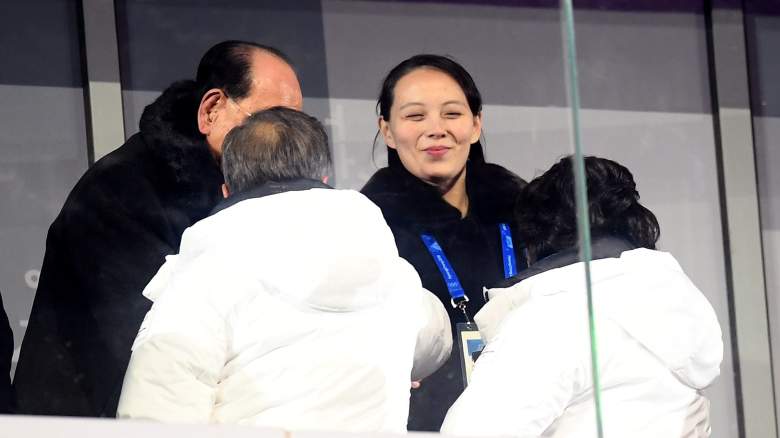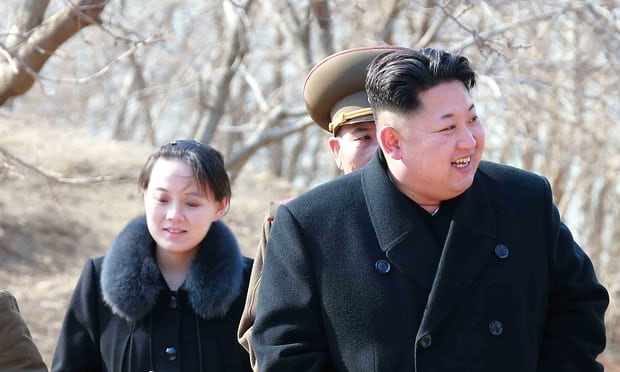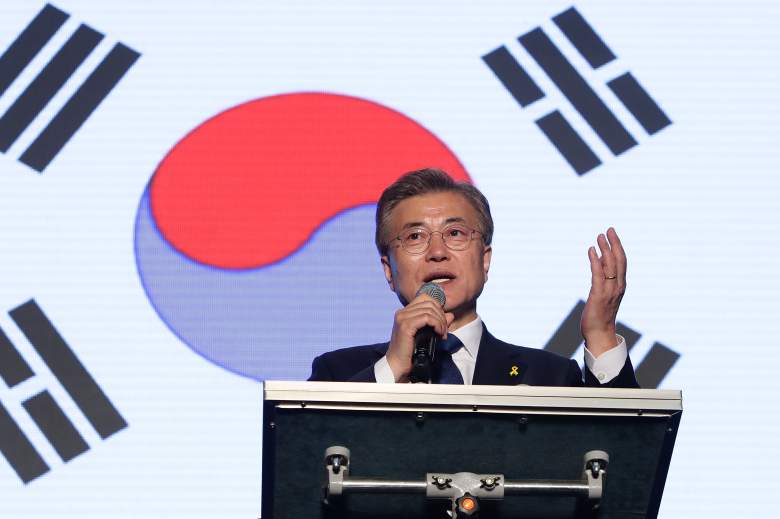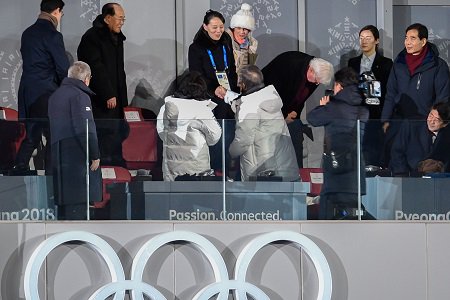
South Korean President Moon Jae-in and North Korean leader Kim Jong-un’s sister, Kim Yo-Jong, shook hands during the 2018 Winter Olympics ceremony in PyeongChang. The handshake was seen as a symbolic moment for two countries technically still at war.
There were 30,000 people in the stadium for the Opening Ceremony Friday night, including a North Korean cheerleading squad and thousands of Korean dancers in a performance meant to highlight the theme of unity.
The last time South Korea hosted the Olympics, in summer 1988,North Korea carried out a terrorist attack, killing 115 people on a passenger plane. Moon Jae-in has expressed desire for dialogue with North Korea and was pleased that the country sent a delegation. The handshake and any subsequent talks could be a move toward peace.
Here’s what you need to know:
1. They Shook Hands During the Opening Ceremony, a Historic and Symbolic Moment
North Korean leader Kim Jong-un’s sister, Kim Yo Jong, who is part of the country’s Olympic delegation to South Korea, shook hands with South Korea President Moon Jae-in in a symbolic handshake. The handshake, which took place near the beginning of the Olympics Opening Ceremony in PyeongChang Olympic Stadium, comes during tension between the two countries, but could be a sign of unity.
Athletes from North and South Korea marched together under the “unification flag” and will compete on a joint women’s hockey team in the 23rd Winter Olympics.
The move could anger the United States delegation, led by Vice President Mike Pence, but could also raise hopes for finding peace between the two nations that are technically still at war.
2. Last Time South Korea Hosted the Olympics, North Korea Carried Out a Terrorist Attack
When South Korea last hosted the Olympics in Seoul in summer 1988, North Korea boycotted and plotted a terrorist attack on a passenger airplane in revenge for not co-hosting. Secret agent Kim Hyon Hui put a bomb on Korean Air Lines Flight 858 in 1987. It killed all 115 people on board.
“The mission was to block the upcoming 1988 Seoul Olympic Games,” she said to CNN.
Kim Hyon Hui and another agent, Kim Seung II, went to Austria to pick up the bomb., which was inside a small Panasonic radio. They then took the bomb to Baghdad, then boarded a plane to Korea. The pair got out on a layover in Abu Dhabi, but left the bomb on the plane, which was headed to Seoul. They planned to escape through Rome and Vienna, but were detained in Bahrain.
Kim Hyon Hui was sentenced to death, but later pardoned by South Korea’s then-President Roh Tae-woo, who said she was also a victim of North Korea’s regime.
This year, about 60,000 people will be working to keep the Olympic Games safe.
3. Kim Yo-Jong is Seen as One of Her Brother’s Most Trusted Advisers

She is North Korean leader Kim Jong-un’s younger sister, and the two are close. They spent four years studying together in Switzerland, and some have saidthat years of isolation together in North Korea brought them closer. According to North Korea Leadership Watch, the siblings lived in a private residence in boarding school. While they have other siblings, many of them are half siblings, while Kim Jong-un and Kim Yo-Jung have the same mother.
In 2017, she was made an alternate member of Politburo, the decision making arm of the Central Committee of the Workers Party of Korea. The decision confirmed her brother’s trust in her. She also plays the role of informant, according to North Korean analyst Ken Gause.
She is credited with developing her brother’s image, and organizing most major public events in North Korea. She has encouraged him to be seen as a man of the people, a strategy that includes school visits, theme park visits, and becoming friends with Dennis Rodman, the former NBA star.
4. Moon Jae-in Has Advocated for Warmer Dialogue With North Korea

Getty
When Moon Jae-in was elected President of South Korea in 2017, he returned the Democratic Liberal party to power after almost a decade.
He has said he is open to dialogue with North Korea, and has advocated for peace between the two countries.
“When it comes to North-South relations, we should lower the military tensions on the Korean Peninsula to create a peaceful environment,” he said in a New Year’s speech. “Both the North and the South should make efforts.”
In January, he credited President Trump with helping force talks.
“I am giving a lot of credit to President Trump,” he said at a nationally televised news conference, according to the New York Times. “I am expressing my gratitude.”
He welcomed North Korea’s delegation to the 2018 Winter Olympics, the first visit from anyone in the regime to South Korea.
“We believe that the North’s announcement of the delegation shows its willingness to ease tensions on the Korean peninsula along with a message of celebration for the PyeongChang Olympic Winter Games,” the government of South Korea said statement. “It is significant that the delegation also includes Kim Yo Jong, who is Chairman Kim Jong Un’s sister and holds an important position in the Workers’ Party of Korea.”
5. The Countries are at War, but This Could be a Sign of Peace
The Korean War started in 1950, when both Koreas claimed to be the legitimate government of all of Korea. The United States and the United Nations came to the aid of South Korea, while China and the Soviet Union backed North Korea.
Seoul changed hands four times, and North Korea suffered a massive bombing campaign. In July 1953, the Korean Armistice Agreement was signed, ceasing hostilities of the Korean War. The armistice was meant to, “insure a complete cessation of hostilities and of all acts of armed force in Korea until a final peaceful settlement is achieved.” It noted that no “final peaceful settlement” had been reached. The armistice resulted in the Demilitarized Zone, the strip of land that runs between the two countries.
Because there was no peace agreement and both sides still claim they have right to the entire peninsula, the war is technically not over. The handshake at the Opening Ceremony could be a sign that both sides are willing to engage in dialogue, and move forward.
Correction: A previous version of this post incorrectly stated that South Korea hosted the summer Olympics in 1998. The year was 1988, not 1998.
